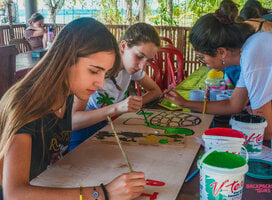Volunteer in Madagascar
Madagascar is a wonderful and unique place to volunteer for wildlife lovers and anthropology geeks alike. As the fourth largest island in the world, it has been geographically and culturally isolated for years. While this has helped to create a fascinatingly unique culture -- which feels like a blend of traveling in Asia and Africa -- and biodiversity, it has also contributed to a lack of modernization and development.
More than 80 percent of the population lives in poverty and the majority of the population of 22 million people lives without access to toilets, running water, and reliable electricity. Additionally, Madagascar's wildlife is threatened by poaching, redwood harvesting, and the destruction of forests for farming and making charcoal.
While volunteering on the red island, you'll have a chance to explore one of the world's most unique countries but also to contribute to the development and preservation of Malagasy culture and wildlife.
Wildlife/Environmental Conservation
Approximately 90% of the flora and fauna found on the island -- like lemurs -- are endemic, meaning they are native and found nowhere else. As a volunteer, you will research protection of the ecosystem and wildlife. Volunteers can help non-profits working to promote conservation in a sustainable way by involving the local Malagasy population.
Marine Conservation
For those interested in marine conservation, Madagascar is one of the country's most affected by climate change. There has been a loss of coral reef protection on the Mozambique Channel due to overfishing.
As a volunteer working in marine conservation, you will help rebuild tropical fisheries with coastal communities. You will participate in activities such as diving to collect data at coral reefs and providing environmental education to locals.
Healthcare
As a health volunteer, you could help with topics such as family planning, maternal, and child health care and/or malaria prevention. You can provide communicable diseases prevention education at local health clinics in rural communities.
In these areas, people may walk upwards of 15 miles to reach a basic health center, where a doctor is not always in and medicine may or may not be in stock. Health clinics need help with vitamin distributions, record keeping and supply chain management often times.
Education
Volunteers can also work with teaching English or assisting in teaching English to Malagasy students and / or adults.
Visas
A 90-day travelers' visa may be obtained at the airport upon arrival if you have a passport valid for at least 6 months past the extended stay. A special one-month extendable visa must be obtained, once in Madagascar, at the Ministry of the Interior. Check Madagascar's Embassy website for details on additional requirements past the 90 days.
Getting Around
Infrastructure such as roads, are some of the most dangerous in the world and traveling by land can be very time consuming. Local buses, called "brousses" are available for budget travelers. On your journeys, you may have to cross water on a bamboo raft, or chug along at a slow pace behind tractor-trailors, along mountain switchbacks. Bring motion sickness medicine, even if you think you don't get motion sick.
Many people fly for a lack of time, in order to see as much as possible. Domestic flights can be costly ($500, for example) through Air Madagascar, but people under the age of 27 and residents of Madagascar receive a discount. Ask about special rates, otherwise they won't mention it to you.
Costs
Overall, cost of living in Madagascar is cheap. You can get lunch or dinner for about 2,000 - 4,000 Ariary ($1 - 1.50), at local Malagasy restaurant or about 10,000 at a nicer "touristy" restaurant (~$5). Hotels can be found for as low as 10,000 Ariary in small towns, and for 30,000 Ariary a night in big cities.
Public transportation, such as brousses, are inexpensive -- fares can be between 2,000 ($1) and 60,000 Ariary ($20) typically, depending on the distance of your ride. Do not pay to put luggage on top of a brousse.
Malagasy currency is called Ariary. It is an exchange rate of about 3,000 Ariary to $1 USD. However, some regions (especially in the north of the island) continue to quote prices on the old currency (Franc), which is about 5x more than the Ariary (e.g. 5,000 Ariary = 25,000 Franc). If a price seems high, it's always a good idea to ask "Franc sa Ariary?"
What People Are Saying
Related Volunteer Abroad Articles
Frequently Asked Questions
-
Where can I volunteer in Africa?
The top 10 countries to volunteer in Africa are Tanzania, South Africa, Ghana, Uganda, Madagascar, Kenya, Namibia, Zimbabwe, Malawi, and Mozambique. However, you can find volunteer opportunities in over 25+ African countries on Go Overseas.
-
Why volunteer in Africa?
There are many reasons to volunteer in Africa: to make a positive impact, to help protect wildlife, to have the opportunity to travel around beautiful countries before or after your volunteer trip, to experience rich and welcoming cultures different than your own, to enjoy a slower lifestyle, and to stand out during a future job search. Africa has a lot of diverse volunteer opportunities in various industries.

























